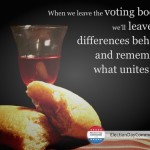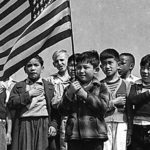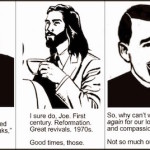We run our website the way we wished the whole internet worked: we provide high quality original content with no ads. We are funded solely by your direct support. Please consider supporting this project.

Politics & the Kingdom of the World
Instead of aligning any version of the kingdom of this world with the kingdom of God—as is common in American Christianity—kingdom-of-God participants must retain a healthy suspicion toward every version of the kingdom of this world. This is especially necessary regarding one’s own version because that’s precisely where we’re most tempted to become idolatrous (see post on making America an idol).
However good any particular government may be by the world’s standards, it is nevertheless strongly influenced by fallen principalities and powers. Consequently, no kingdom-of-God citizen should ever place undue trust in any political ideology or program.
However good any particular version of the kingdom of the world may be, it does not hold the ultimate answer to the world’s problems. It may indeed be better in certain respects at maintaining law, order, and justice, for which we should be thankful. But the kingdom-of-God citizen knows that the world is not going to be fundamentally transformed by the use of the sword. We know that love, peace, and justice will not be experienced on a global scale until the kingdom of God is permanently established.
In fact, the kingdom-of-God citizen should know that, far from holding the ultimate answer to the world’s problems, even the best versions of the kingdom of the world are part of the world’s problem. The fundamental problem in the world is that fallen people trust coercion rather than love. Because we are in bondage, we tend to preserve and promote our self-interests with force. Far from resisting this coercive tendency, even the best versions of the kingdom of the world have to capitalize on it.
Every version of the kingdom of the world defends itself and advances its cause by rallying the self-interest of its citizens into a collective tribal force that makes each citizen willing to kill and be killed for what it believes to be the good of the society. It survives and advances by uniting and motivating its subjects around their distinctive collective identity, ideas, self-interest, and desires for security—over and against any individuals or governments whose own tribal identity, ideals, self-interest, and desire for security might impinge on or threaten their own.
To this end, every version of the kingdom of the world demonizes its enemies when necessary to generate the motivation to go to war and to convince those who must spill blood that their cause is righteous.
This “us-them” mindset makes conflict inevitable. As long as people are willing to advance their self-interest by force, and so long as their sense of identity, worth, and security is rooted in their national, ethnic, religious, or political distinctives—there will be violence and injustice.
Until the kingdom of God transforms the entire globe, conflict is inevitable. This is not in any way to suggest that the kingdom-of-God people should not pray and strive for peace in the world, for we are called to be peacemakers (Matt 5:9). Though we are not “of” this world, we are “in” it. But we must also remember that the essential problems of the world, including its inescapable tendency toward violence and conflict will not be finally resolved until human nature is fundamentally transformed by the complete coming of the kingdom of God.
And the only way for kingdom-of-God citizens to move toward this ultimate goal is for them to exercise love rather than coercion. This only happens as the mustard seed of the kingdom (Matt 13:31-32) grows through individual and corporate replications of Calvary.
—Adapted from The Myth of a Christian Nation, page 55-57
Image by Stephanie McCabe via Unsplash
Category: General
Tags: Kingdom of God, Kingdom of this World, Nationalism, Political Idolatry, Politics
Related Reading

One Hope
When Jesus was crucified by his enemies instead of conquering his enemies, the hope of Jesus’ disciples came crashing down in utter despair. They had hoped that Jesus would establish the kingdom of God in the same way that other kingdoms were established. However, the resurrection reveals that the kingdom of God is not like…

Election Day Communion Resources
Rachel Held Evans posted today about Election Day Communion and provided resources for those of you who cannot attend one of these services. Let’s all be praying today for unity among the saints and blessings of peace regardless of the outcome of this election.

The Life and Death of MLK and What it Might Have to Say to Us
Tony Fischer via Compfight Here is an EXCELLENT reflection from Jonathan Martin in answer to a question that was posed to him on how he reconciles his rejection of the politics of this world with the social justice work of MLK. This is a must read. From the article: So to come to the question,…

Podcast: Can Government Be Saved?
Greg talks about Shane Claiborne, government, and ministry. http://traffic.libsyn.com/askgregboyd/Episode_0430.mp3

Podcast: Do You See a Difference Between Patriotism and Nationalism?
Greg separates the wheat from the chaff in this allegiance-busting politically provocative episode. http://traffic.libsyn.com/askgregboyd/Episode_0380.mp3

